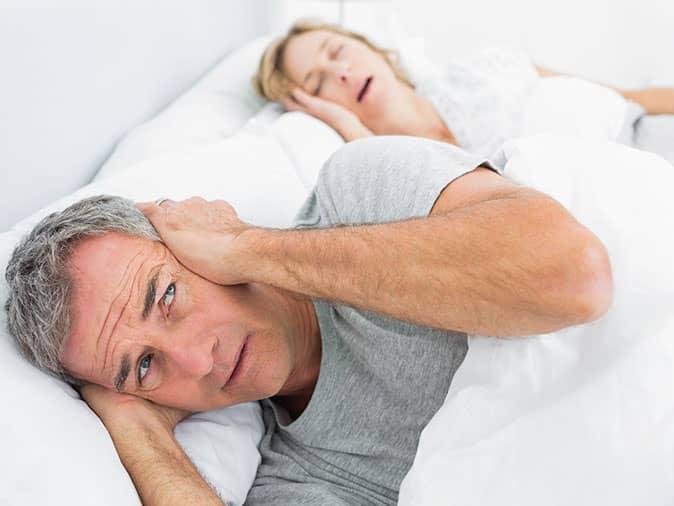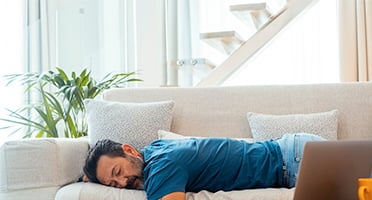Sleep apnea is a sleep-disordered breathing condition characterized by pauses in breathing while you sleep. These pauses last anywhere from several seconds to much longer, depending on the severity of your condition, and can happen hundreds of times per night. Sleep apnea leaves you unrested and irritable with headaches, memory problems, and more. If you’re experiencing sleep apnea symptoms, get a home sleep test from SleepTest.com to find out if you have sleep apnea, what type you have, its severity, and your treatment options.
In all cases of sleep apnea, your breathing pause will last until your brain panics from the lack of oxygen and excess CO2 and awakens you. You likely won’t notice these awakenings because they are so brief. But the fragmented sleep you experience with untreated sleep apnea is detrimental to your health, wellness, and quality of life.
If you find yourself thinking, “Wow, this sounds serious!” you’re right. Sleep apnea is a serious condition that requires treatment to relieve symptoms. But all the news isn’t bad. There are sleep apnea treatments to fit your lifestyle. The most popular sleep apnea treatment is a CPAP machine.

There are three types of sleep apnea: obstructive sleep apnea, central sleep apnea, and complex sleep apnea.
Obstructive Sleep Apnea (OSA): Your pauses in breathing stem from a blockage in your airway, usually from sagging soft tissues such as your tongue and soft palate. Treatment options for OSA are CPAP, oral appliance therapy, or surgery.
Central Sleep Apnea (CSA): With this type of sleep apnea, your brain fails to tell your lungs to breathe for seconds or a minute at a time. You can treat CSA with a CPAP machine.
Complex Sleep Apnea: This combination of OSA and CSA is sometimes called “treatment-emergent sleep apnea.” You’ll start with OSA and develop a dependence on your CPAP machine—meaning that your brain will only tell your lungs to breathe when your airway is stimulated by the constant air pressure from the CPAP.
How Does CPAP Work?
CPAP stands for continuous positive airway pressure. It’s a machine that delivers oxygen to your body through a tube connected to a mask you wear when you sleep. The air pressure from the CPAP is just high enough to keep your airway open while you sleep, regardless of sagging tissues.
You can use different types of masks to enhance your comfort, as well as different-sized CPAP machines for everyday use and travel. Clinically, CPAP is 100% effective in treating all severities of OSA, CSA, and complex sleep apnea. And CPAP was the first non-surgical obstructive sleep apnea treatment. With stats like that, it’s easy to see why it’s popular!
However, not everyone jumps up and down to get a CPAP machine. Many people find it cumbersome and uncomfortable. In fact, CPAP’s effectiveness in practice ranges from 17 to 71% because it’s hard for patients to adhere to.
Is CPAP Right for Me?
CPAP treatment could be the right sleep apnea treatment for you! Consider CPAP if:
- You have severe sleep apnea
- You have central sleep apnea
- You have complex sleep apnea
- You will be diligent about cleaning it after every use
- You’ll be able to adhere to treatment every time you sleep
- You’re willing to take your CPAP with you while traveling
- You’re willing to have a battery-powered CPAP option for overnights without electricity
Alternative Sleep Apnea Treatment: Oral Appliance Therapy
If you think that CPAP may not be the best option for you, you aren’t alone. Many people consider alternative sleep apnea treatments. One treatment rising in popularity is Oral Appliance Therapy. Oral appliance therapy can treat mild to moderate obstructive sleep apnea without the use of a machine or masks. It’s a small, sleek oral device that you wear in your mouth every time you sleep: no electricity or distilled water required.
How Effective is Oral Appliance Therapy?
Oral appliance therapy effectively treats mild to moderate obstructive sleep apnea, and adherence rates are about 80%. Your oral appliance will gently reposition your jaw, giving your tongue and soft tissues more room. Even though they relax when you sleep, there is still room for oxygen to pass through. Think about getting an oral appliance if:
- You have mild to moderate obstructive sleep apnea
- You can’t tolerate a CPAP machine
- You need something small and light for rare situations without electricity
- You travel and need to sleep in airplanes or on trains
- You need a cost-effective treatment
How to Get an Oral Appliance for Sleep Apnea
First-line treatment for sleep apnea is usually a CPAP because of its effectiveness (as long as you use it). However, if you want to try an oral appliance, you can get a referral to a sleep dentist from SleepTest.com or try to find a sleep dentist in your area who is experienced in sleep dentistry. Dentists are the perfect option for a sleep doctor because they have the unique ability to work with your jaw to ensure you don’t develop other issues such as TMJ disorder.
Order Your Sleep Test from SleepTest.com
Are you concerned that you may have sleep apnea? Order an at-home sleep test from SleepTest.com. Our home sleep studies are accurate, easy to use, and comfortable. Visit our website and order your sleep apnea test; you’ll be glad you did!

Feeling tired all the time, even after a full night’s sleep? You might be suffering from sleep apnea. Discover how an at-home sleep test can help diagnose the root cause of your fatigue—and get you back to feeling like yourself.

Spring is here—and so is the pollen. For the millions dealing with seasonal allergies, the symptoms can be more than just annoying. And if you also have sleep apnea, those stuffy nights and restless sleep can get even worse.
Let’s take a closer look at how spring allergies and sleep apnea affect each other—and what steps you can take to sleep more comfortably.




